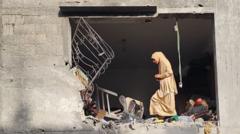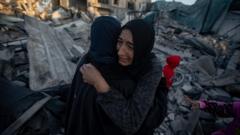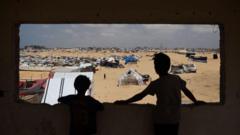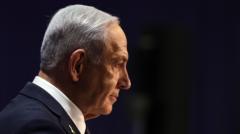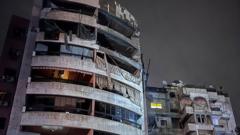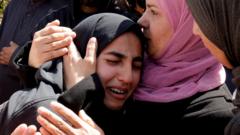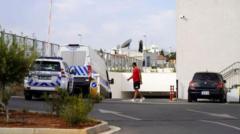The Israeli military's recent airstrike on Hezbollah's stronghold amidst ongoing tensions raises concerns over the future peace in the region.
Israel Targets Hezbollah Operative in Beirut Airstrike as Tensions Rise

Israel Targets Hezbollah Operative in Beirut Airstrike as Tensions Rise
An escalation in conflict threatens the stability of an already fragile cease-fire.
In a significant escalation of conflict, the Israeli military conducted an airstrike on the southern suburbs of Beirut early Tuesday, marking the second attack in the vicinity of Lebanon’s capital within a week. The assault comes on the heels of a cease-fire agreement reached in November, which had fostered hopes of ending Lebanon's most deadly conflict in decades. However, the latest strikes have reignited fears that this fragile truce could be in jeopardy.
According to the Israeli military, the targeted strike aimed at a Hezbollah operative believed to be instrumental in planning an "imminent" offensive against Israel. This action was described as necessary to neutralize an "immediate threat" posed by this operative, situated in the Dahiya region renowned as a Hezbollah stronghold. The military emphasized the operatives' involvement with Hamas in orchestrating potential attacks on Israel.
In the backdrop of this attack, Hezbollah has remained silent on its official Telegram platform regarding the recent strikes. The Israeli military also highlighted a prior airstrike on Friday in the same area, followed by an evacuation order for residents of a densely populated neighborhood. That previous operation was initiated shortly after rockets were launched into northern Israel from Lebanese territory.
Despite these developments, Hezbollah has publicly denied any connection to the rocket attacks, asserting its commitment to the cease-fire. Reports from Lebanon's Health Ministry confirmed that at least three individuals were killed in separate Israeli airstrikes in southern Lebanon, amid ongoing clashes and airstrike responses.
This surge in conflict follows a series of actions initiated by Hezbollah, firing rockets and drones in solidarity with their Palestinian ally, Hamas, after a major attack on Israel on October 7, 2023, which precipitated a full-scale war. As tensions mount, the delicate balance of peace in the region remains uncertain, and the implications of these military actions will be closely monitored by international observers.
According to the Israeli military, the targeted strike aimed at a Hezbollah operative believed to be instrumental in planning an "imminent" offensive against Israel. This action was described as necessary to neutralize an "immediate threat" posed by this operative, situated in the Dahiya region renowned as a Hezbollah stronghold. The military emphasized the operatives' involvement with Hamas in orchestrating potential attacks on Israel.
In the backdrop of this attack, Hezbollah has remained silent on its official Telegram platform regarding the recent strikes. The Israeli military also highlighted a prior airstrike on Friday in the same area, followed by an evacuation order for residents of a densely populated neighborhood. That previous operation was initiated shortly after rockets were launched into northern Israel from Lebanese territory.
Despite these developments, Hezbollah has publicly denied any connection to the rocket attacks, asserting its commitment to the cease-fire. Reports from Lebanon's Health Ministry confirmed that at least three individuals were killed in separate Israeli airstrikes in southern Lebanon, amid ongoing clashes and airstrike responses.
This surge in conflict follows a series of actions initiated by Hezbollah, firing rockets and drones in solidarity with their Palestinian ally, Hamas, after a major attack on Israel on October 7, 2023, which precipitated a full-scale war. As tensions mount, the delicate balance of peace in the region remains uncertain, and the implications of these military actions will be closely monitored by international observers.

